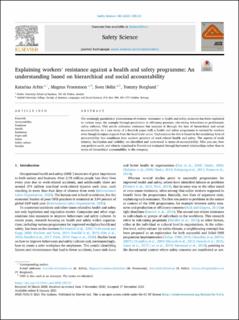Explaining workers’ resistance against a health and safety programme: An understanding based on hierarchical and social accountability
Peer reviewed, Journal article
Published version
Permanent lenke
https://hdl.handle.net/11250/2975745Utgivelsesdato
2021Metadata
Vis full innførselSamlinger
Sammendrag
The seemingly paradoxical phenomenon of workers’ resistance to health and safety measures has been explained in various ways, for example through production or efficiency pressure, risk-taking behaviours or problematic safety cultures. This article addresses resistance but analyses it through the lens of hierarchical and social accountability. In a case study of a Swedish paper mill, a health and safety programme is resisted by workers even though it enjoys support from the local trade union. Explanations for this is found in the socialising form of accountability that conditions how workers perceive of work-related health and safety. The aspects of work identity, facilitation and visibility are identified and understood in terms of accountability. Who you are, how you perform work, and what is visualised is filtered and evaluated through horizontal relationships rather than in terms of hierarchical accountability to the company.
